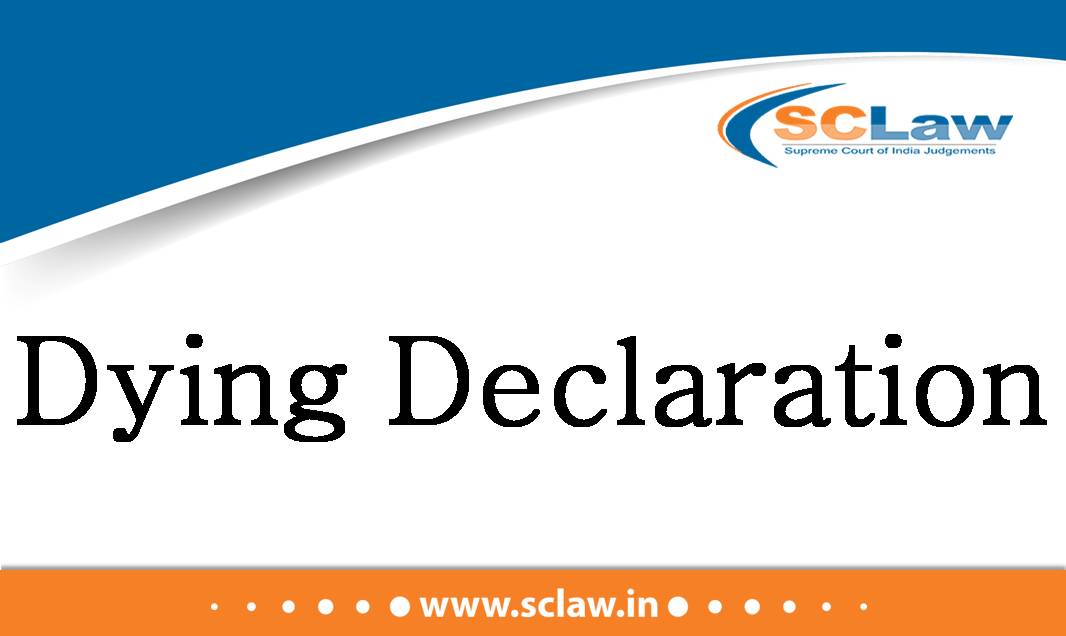Service Law – Upgradation under the Assured Career Progression Scheme (ACP) Scheme – A case where a junior was drawing more pay on account of upgradation under the ACP Scheme and there was an anomaly and therefore, the pay of senior was required to be stepped up
SUPREME COURT OF INDIA DIVISION BENCH UNION OF INDIA AND OTHERS — Appellant Vs. SHRI C.R. MADHAVA MURTHY AND ANOTHER — Respondent ( Before : M. R. Shah and B.V.…
Right against deprivation of property unless in accordance with procedure established by law, continues to be a constitutional right under Article 300-A – Forcible dispossession of a person of their private property without following due process of law, was violative of both their human right, and constitutional right under Article 300-A.
SUPREME COURT OF INDIA DIVISION BENCH SUKH DUTT RATRA AND ANOTHER — Appellant Vs. STATE OF HIMACHAL PRADESH AND OTHERS — Respondent ( Before : S. Ravindra Bhat and Pamidighantam…
HELD the deceased was done to death by strangulation and thereafter an attempt was made to camouflage the death as one which arose out of burn injuries. The evidence of PWs 1, 2 and 3 is quite consistent, cogent and firmly establishes not only the demands for dowry but dowry related harassments that the deceased was subjected to. Appeal dismissed.
SUPREME COURT OF INDIA FULL BENCH SAREPALLI SREENIVAS AND OTHERS — Appellant Vs. STATE OF ANDHRA PRADESH — Respondent ( Before : Uday Umesh Lalit, S. Ravindra Bhat and Pamidighantam…
HELD the recommendations made by the Corporation in introducing the ORSP Rules, 2008 for the employees of the Corporation in the absence of being approved by the Administrative Department, i.e., MSME, in the instant case, and by the Finance Department were not available for implementation and the finding which has been recorded by the learned Single Judge and affirmed in appeal, in our considered view, is not sustainable and deserves to be set aside.
SUPREME COURT OF INDIA DIVISION BENCH ODISHA STATE FINANCIAL CORPORATION — Appellant Vs. ODISHA STATE FINANCIAL CORPORATION EMPLOYEES UNION AND OTHERS — Respondent ( Before : Ajay Rastogi and Sanjiv…
HELD that whether corporate death of an entity upon amalgamation per se invalidates an assessment order ordinarily cannot be determined on a bare application of Section 481 of the Companies Act, 1956 (and its equivalent in the 2013 Act), but would depend on the terms of the amalgamation and the facts of each case – “an assessment can always be made and is supposed to be made on the Transferee Company taking into account the income of both the Transferor and Transferee Company. “.
SUPREME COURT OF INDIA DIVISION BENCH PRINCIPAL COMMISSIONER OF INCOME TAX (CENTRAL) – 2 — Appellant Vs. M/S. MAHAGUN REALTORS (P) LIMITED — Respondent ( Before : Uday Umesh Lalit…
Recruitment in Army – Illegal gratification – Malpractices of clearing some candidates as medically fit, who were not otherwise fit, took place — AFT would be justified in interfering with the finding of the courtmartial where its finding is legally not sustainable due to any reason whatsoever – Extrajudicial confession is a weak piece of evidence –
SUPREME COURT OF INDIA DIVISION BENCH UNION OF INDIA AND OTHERS — Appellant Vs. MAJOR R. METRI NO. 08585N — Respondent ( Before : L. Nageswara Rao and B.R. Gavai,…
Probation of Offenders Act, 1958 – Sections 3 and 4 – Theft – Probation – Sections 360 and 361 of the Cr.P.C also empower the courts to release the offenders on probation of good conduct HELD having regard to sentence imposed by the courts below on the appellants for the offence under Section 379 read with Section 34 of IPC, and having regard to the fact there are no criminal antecedents against the appellants, the court is inclined to give them the benefit of releasing them on probation of good conduct –
SUPREME COURT OF INDIA DIVISION BENCH SOM DUTT AND OTHERS — Appellant Vs. THE STATE OF HIMACHAL PRADESH — Respondent ( Before : Sanjiv Khanna and Bela M. Trivedi, JJ.…
Criminal Law – Dying declaration – Merely because the weapon used is not recovered cannot be a ground not to rely upon the dying declaration. HELD Rioting – Merely because three persons were chargesheeted/charged/tried and even out of three tried, two persons came to be acquitted cannot be a ground to not to convict the accused under Section 148 IPC.
SUPREME COURT OF INDIA DIVISION BENCH THE STATE OF UTTAR PRADESH — Appellant Vs. SUBHASH @ PAPPU — Respondent ( Before : M.R. Shah and B.V. Nagarathna, JJ. ) Criminal…
Right of defendant to prosecute the plaintiff owing to the dishonour of the cheque issued by the plaintiff cannot be frustrated by seeking a declaration that the said cheque was handed over as a security – Such a declaration cannot be ex facie granted as it would be contrary to the provisions of the N.I. Act and particularly Section 118(a) thereof – Hence, the plaint is liable to be rejected in exercise of jurisdiction under Order VII Rule 11 CPC.
SUPREME COURT OF INDIA DIVISION BENCH M/S FROST INTERNATIONAL LIMITED — Appellant Vs. M/S MILAN DEVELOPERS AND BUILDERS (P) LIMITED AND ANOTHER @ RESPONDENT ( Before : M.R. Shah and…
Public Premises (Eviction of Unauthorised Occupants) Act, 1971 – Section 9 – Eviction – Section 3(1) of the Nationalisation Act, declares that on the appointed day, which was 01.05.1973, the right, title and interest of the owners in relation to the coalmines specified in the Schedule shall stand transferred to and shall vest absolutely in the Central government free from all encumbrances – As could be seen from clause (xi) of Section 2(h), even the lands and buildings used solely for the location of the management, sale or liaison offices or for the residence of officers and staff were also included in the definition of the word “mine”
SUPREME COURT OF INDIA DIVISION BENCH M/S BHARAT COKING COAL LIMITED — Appellant Vs. MAHENDRA PAL BHATIA AND OTHERS — Respondent ( Before : Hemant Gupta and V. Ramasubramanian, JJ.…













